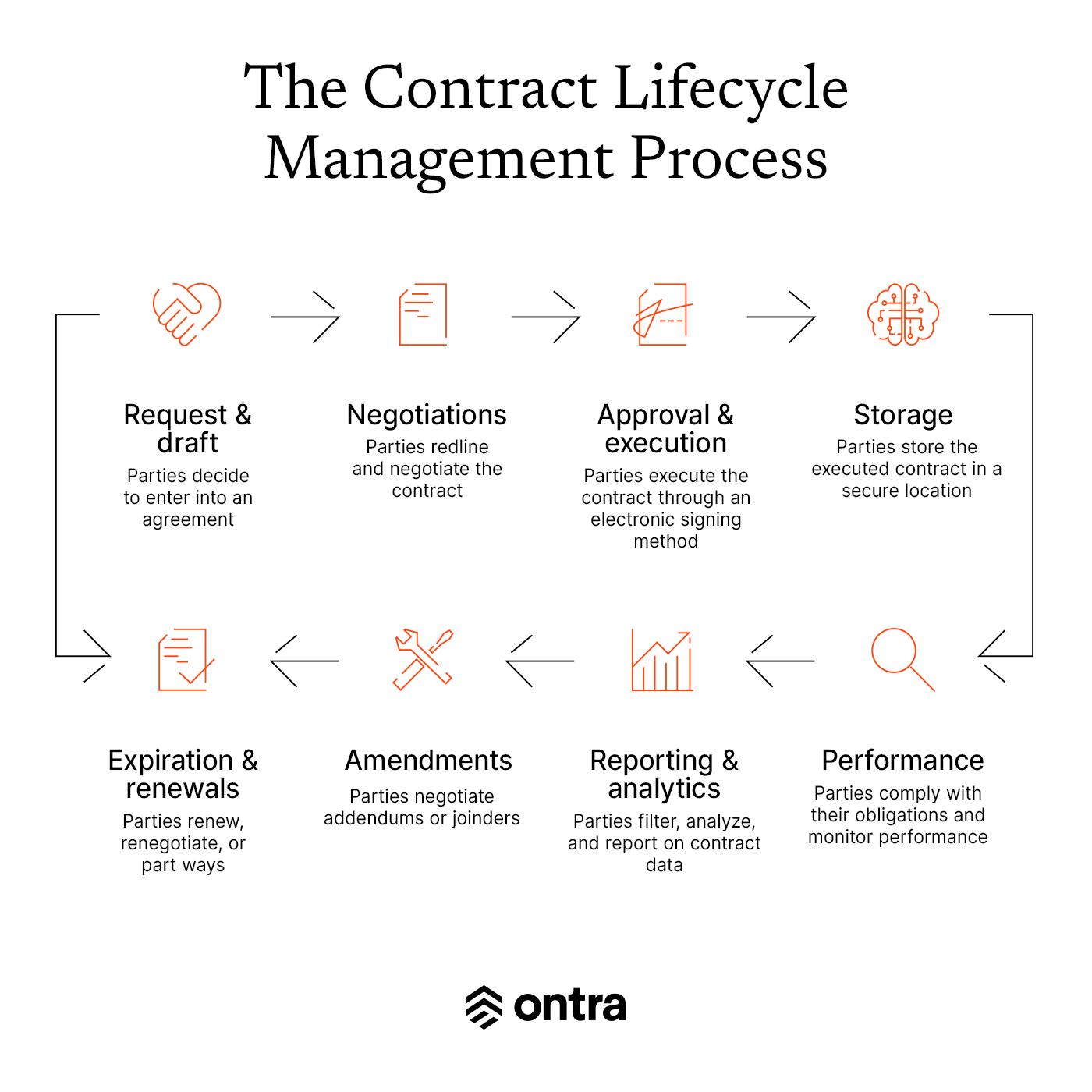Contract management systems and document management systems have several similarities. However, there are fundamental differences between the two, which means they aren’t interchangeable software solutions.
Document management serves a different purpose than contract lifecycle management, and businesses need to understand their pain points and goals to effectively choose between the two. Depending on the use case, an organization might benefit from one or the other — or both.
What is contract management?
Contract management is the ability of businesses to plan for, create, and enforce their contracts with other parties. A contract management platform specifically helps businesses manage CLM processes efficiently and effectively. A software solution should support companies in creating, negotiating, executing, storing, enforcing, and renewing their agreements.
In the past, professionals used the terms contract management and contract lifecycle management differently. However, at this point, either term typically means using a software solution to manage business contracts from start to finish. People might also use the term contract management system to mean the same technology and processes.

What is document management?
Document management is a broader function than contract management. Businesses use a document management system to create, capture, store, manage, and retrieve all electronic documents in various file formats.
Typically, a DMS enables colleagues to collaborate on documents. The software tracks ownership of a document, who’s working on it, and versions. Then a DMS lets people organize and store previous versions and finalized documents in folders and subfolders. Document management solutions are great tools for distributed teams that need to develop content together in a streamlined workflow.
Comparing contract management and document management solutions
The similarities
Both document and contract management solutions can offer:
- Centralized storage
- Encryption and other cybersecurity features
- Organization and indexing
- Collaboration tools
- Access permissions
- Version control
- Business continuity
- Audit trails
- A search function
These are fundamental features and benefits of any document or contract management system. Both offer a centralized repository, usually cloud based, that an organization can use to become more secure and efficient compared to employees saving documents on their various devices.
The differences
Depending on the specific product, contract management software can include:
- Contract templates
- Redlining features and negotiation tracking
- Electronic signature integrations
- Automated approval processes
- Trigger-based notifications and alerts
- Obligation tracking features
- Contract data and analytics
While a document management system allows colleagues to collaborate on documents, it won’t have features that specifically address negotiating and executing contracts. It also won’t have features that automate or optimize obligation management, contractual compliance, and renewals. Instead, a DMS is meant to manage day-to-day business documents.
Another important distinction is how these systems capture data. Document management systems typically have relatively simple organizational structures, such as folders and subfolders. The search feature might only be able to pull documents based on limited factors, such as folder and file names, and not based on the content of the documents themselves. In this situation, a business can’t use document data to build reports or trigger notifications.
A CLM solution, however, captures contract data and gives businesses various features to use that data, from alerts and notifications to more robust search functions and data analytics.
How to choose
Whether a business needs specific contract lifecycle management software or more general document management software depends on the volume of their legal agreements.
Enterprises with a large volume of agreements, such as employment contracts and vendor agreements, and ongoing contractual obligations will benefit from a contract management solution. Whereas a DMS won’t help that business negotiate, execute, enforce, and comply with their agreements more efficiently. In other words, it won’t help the company mitigate the risk of noncompliance, which could have legal, reputational, and regulatory consequences.
Businesses that want more organized and secure documents but don’t deal with a high volume of contracts might find a better fit with a document management system. A DMS can store draft and executed contracts, and the business can use other means to ensure compliance.
Can a business use both?
Depending on a business’s size and the volume of its documents, it may benefit from both software solutions. These technology solutions can complement each other rather than compete.
Enterprises may be large enough to invest in CLM and DMS solutions for different departments. Certain functions might interact with a contract management solution, while others that don’t handle contract-related tasks would use a DMS.
Contract management for private markets
Ontra provides the Legal Operating System for the entire private fund lifecycle, from fundraising to routine contract negotiations and obligation management.
Through our Contract Automation solution, firms can automate and outsource their high-volume, routine agreements, such as NDAs, to our global Legal Network. Most importantly, firms can track negotiations in real time within our Contract Automation platform. Once firms finalize their agreements, including Limited Partnership Agreements and side letters, they can store them and track their investor obligations in Insight.
Ontra’s Contract Automation and Insight platforms connect firms with their contract data, providing greater transparency into their fund documentation.


